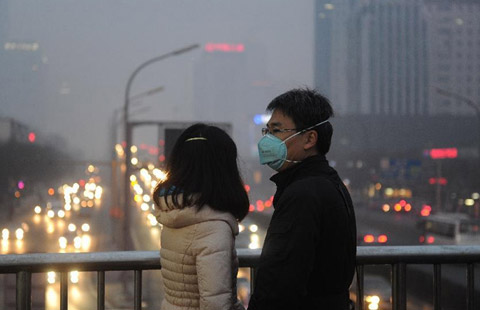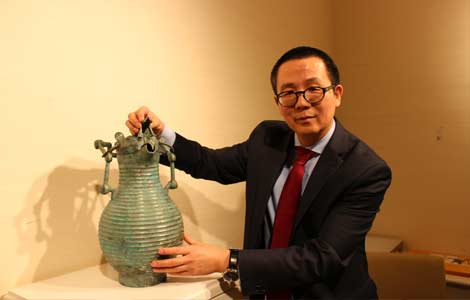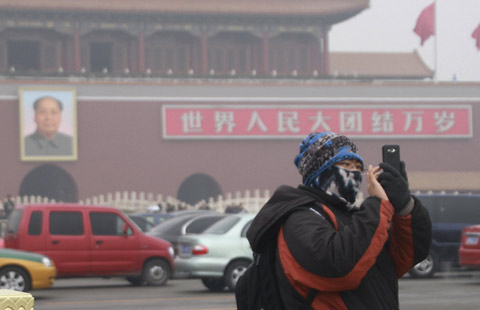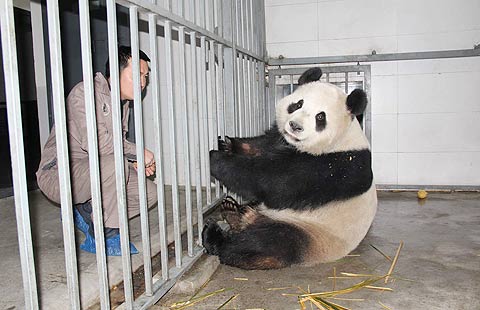Growth drop is not a cause for alarm, minister says
Updated: 2014-02-24 03:29
By Zheng Yangpeng (China Daily)
|
||||||||
Weaker role of manufacturing is 'positive sign for economy'
Finance Minister Lou Jiwei has dismissed concerns that recent data showing a weakening manufacturing sector indicate a possible deep slide in the country's economic growth, saying a strengthening service sector points to a "reasonable restoration".
Responding to worries of a hard landing for China at a time of fragile global recovery, the outspoken minister said over the weekend that the past rapid expansion of China's manufacturing industry was "unsustainable".
He said the weaker role played by manufacturing in the past year is a positive sign for China's economy.
Speaking at a G20 meeting of finance ministers and central bank governors in Sydney, Australia, Lou said: "The manufacturing sector once took up nearly 60 percent of the economy and contributed to more than 50 percent of the global growth. This brought along pollution and overcapacity and is unsustainable."
"In 2013, the share of manufacturing fell while the share of service industries rose to 46 percent, exceeding that of manufacturing, and this is a reasonable restoration," he said.
China's manufacturing activities are likely to contract for a second consecutive month in February, reaching the lowest level in the seven months since July, British bank HSBC Holdings PLC said on Thursday.
The flash reading of the HSBC Manufacturing Purchasing Managers' Index is forecast to drop to 48.3 in February from 49.5 in January, and 50.5 in December, suggesting the underlying momentum for manufacturing growth is weakening.
Xu Hongcai, a researcher at China Center for International Economic Exchanges, said: "The index showed China's economy does face downward pressure, but this should not be overstated. A number of previously negative factors are diminishing: The catering and hotel industry has adapted to the impact of the government thrift campaign, and the reform agenda set by the central government will show its dividends this year."
In 2013, the moderate expansion in manufacturing was somewhat offset by the pickup in the service sector. Data from the National Bureau of Statistics showed that in 2013, the service sectors had managed to grow faster than the manufacturing sector. They expanded 8.3 percent over the previous year, whereas manufacturing grew by 7.8 percent.
For 13 years, China's manufacturing sector has outperformed the service sector.
The trend seemed to reverse as the government increasingly pivots toward restructuring the economy away from investment and exports.
In 2012, the growth rates of the two sectors were on a par before the service sector outperformed manufacturing the following year.
The service sector was also more stable compared with manufacturing and was less vulnerable to fluctuations in the global economy, according to historical data.
In 2008, when manufacturing tumbled as a result of a setback in exports because of the outbreak of the US financial crisis, the service sector was less affected and posted faster growth than manufacturing, which was unusual at the time.
While China's manufacturing sector is plagued by rising labor costs, growing overcapacity and renminbi appreciation, economists said the service sector has a much larger room for growth thanks to years of underdevelopment.
Xu said the faster expansion rate of the service industry and other phenomena such as private investment outpacing State-led investment are positive signs that the economy is increasingly relying on domestic demand.
Zhou Xiaochuan, governor of the People's Bank of China, told his counterparts at the G20 meeting that reforms to rebalance the economy will continue. He said that the current account surplus last year was just 2.1 percent of GDP, down from as much as 10 percent during the boom years of the last decade.
Zhou said China's rising debt-to-GDP ratio and high leveraging of the corporate sector have already caught the government's attention.
He said China's large store of savings is being channeled through the banking system, pushing up credit growth and raising debt levels. Improving the nation's direct financing will be a "long task", he said.
China is "vigilant" about financial risks, and is keeping a close eye on its "shadow banks" — a sector that is growing quickly, though its overall size is not big, Zhou said.

 Sochi closes Olympics, clearing shadows of doubt
Sochi closes Olympics, clearing shadows of doubt
 China's giant pandas arrive at Belgian zoo
China's giant pandas arrive at Belgian zoo
 Ukrainian parliament dismisses president
Ukrainian parliament dismisses president
 Beijing upgrades haze alert from yellow to orange
Beijing upgrades haze alert from yellow to orange
 Rare Zhou bronze wine vessel goes on the block
Rare Zhou bronze wine vessel goes on the block
 Reclaiming a heritage lost, stolen or sold
Reclaiming a heritage lost, stolen or sold
 US warns of airline shoe-bomb threat
US warns of airline shoe-bomb threat
 Beijing issues 1st yellow alert for smog
Beijing issues 1st yellow alert for smog
Most Viewed
Editor's Picks

|

|

|

|

|

|
Today's Top News
Ukraine's new govt needs to seek balance: experts
Hospitals aim to prescribe more security
US political drama tells much about us
Think tank examines South China Sea
People shun outdoors amid smog
Gaokao gets accepted overseas
China urges US to correct mistakes on Tibet
9 punished for spreading flu rumor
US Weekly

|

|






